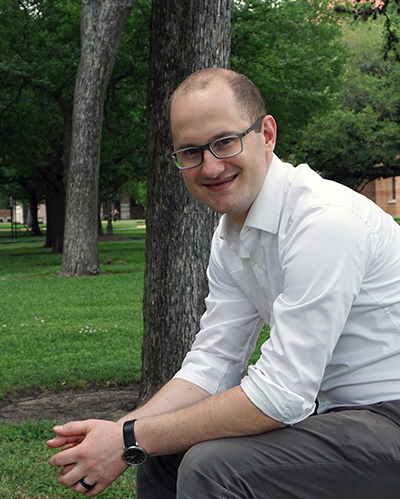 David Sullivan’s interest in artificial intelligence (AI) began in elementary school and never dwindled.
David Sullivan’s interest in artificial intelligence (AI) began in elementary school and never dwindled.
The Rice University computer science alumnus (MCS ’15) said, “As a kid, I was into books, movies, and television shows about robots, science fiction and fantasy.
“Going through school, I loved math and software development. Even though I wasn’t a CS major, my passion for math and engineering made for a very natural fit with machine learning (ML) and AI.”
Sullivan said he took a lot math, statistics, and physics classes – courses that provided a foundation he continues to use in his career as a data scientist.
“Many of the ML models were originally developed for physics. One of my friends is doing work in theoretical physics – far beyond what I know – but we can still talk about the same software tools and statistical techniques,” he said
While completing his undergraduate degree in Physics, Sullivan realized he needed to learn the computer science aspects of programming and problem solving, so he applied for the professional master’s program in Rice’s CS department.
Now Sullivan combines his statistical training and software development expertise at New Knowledge. The Austin startup incorporates AI and ML into their mission to identify social media threats like propaganda, and disinformation.
“Data scientists usually fall into two camps – those who know math really well but don’t code efficiently, and those who are great coders but don’t have a solid foundation in statistics. I can speak to both sides, so I am right in the middle –exactly where I wanted to be.”
Sullivan said the job of a data scientist changes from week to week. “That’s exciting for me, and part of the reason why I’m also interested in startups. My primary job is to identify propaganda and disinformation on the Internet. I also do some work on a government research program to automate the whole ML process in general. That work will take us one step closer to the AI that people see in movies.”
Recently, he’s been working on the development of a robust system to automate initial research and testing of data science techniques. In addition to being on the cutting edge of modeling human behavior on the Internet, his team’s automation work will help reduce the friction between developing and testing scientists’ hypotheses.
“That’s where my software engineering and math backgrounds really come into play. Because I understand what tools the data scientists need to be successful and I can also build out those tools,” said Sullivan.
He does his best work in small teams of like-minded professionals, and prefers the risk associated with startups to the traditional career paths found in established organizations.
“I always wanted to start my own company or get in on the ground floor of a startup,” he said. “In a startup, you only work with people who care deeply about the same projects. Twelve months ago, I came on board as one of the first three people hired by the founder. The four of us became really close, then we hired two more people, then a few more. Within a year, we were at 20 employees.
“Except for the people hired in the last few weeks, I’ve gotten to know everyone in the company pretty well. Having a tight social network in the office is important to me. But I also like planning and building quickly, breaking things, fixing them, and moving on.”
He said it is possible to fail ‘well’ in both big and large organizations. In large organizations, the opportunity to learn through failure often comes through the work of others, like when another engineer on the same team mitigates damage by quickly fixing a problem.
“A startup is a great place to fail because it is completely up to you and a small group of people to fix what you break. That feels better to me. It is more exciting to have less of a safety net – and its inherent restrictions – in order to have more freedom to explore and learn by doing.”
His preference for freedom and risk is a good fit for New Knowledge. Even among startups, they are a nimble, problem-oriented organization. At an Austin technology meet-up, Sullivan heard the founder describe using OpenCV to hunt for extremist groups on the Internet.
“Jonathon Morgan has worked in this space for a while, and in his talk, he discussed scouring the Internet for Nazi imagery and the way disinformation is spread across the Internet. After that talk, a few of us from the audience hung out with Jonathon and talked for hours. At the end, he said he was hiring and after a few interviews I joined his initial team. And we’re still hiring.”
Sullivan credits his Rice master’s degree for his career path and he’s talked about the MCS program on Quora.
He said, “The MCS alumni have great job opportunities. The Rice name is big. In Houston, it opens every door. But even in Austin and the Silicon Valley, most of the big brands and a lot of the startups know about us. And the reason they know about us is because we produce results. You can have everything you need to be successful when you leave Rice.
“Every day is a good day at work because I get hard problems to solve and I’m working with a great team to solve them. There are definitely some hard days, days when I’m beating my head against a problem that I’m not sure I can solve. But it’s still rewarding because there is always something new to chase.”
